I did not expect to wake up a couple of weeks ago to the news that Pope Benedict XVI had announced his abdication. As of last week, His Holiness retired to a monastery and the cardinals now begin convening to choose his successor. There hasn’t been a voluntary abdication since the 13th century, and the last Pope to leave alive did so almost 400 years ago.
So my Twitter feed was filled with the usual lame and boring and predictable jokes while my news sites talked about what this meant for the Church. I don’t know any Catholics who are not lapsed or very irregular in their attendance, so I couldn’t ask what a living ex-Pope means to them. I understand it is probably ecclesiastically complicated.
And now the Cardinals and Archbishops gather in Rome to choose a Pope, a leader for the Catholic Church after decades of scandal, a declining church in Europe and the continual conflict between Secular Humanism and Divine Revelation. From the perspective of many observers, a lot of this comes down to “So what does the Pope do, exactly?”
Well, if you play historical strategy games, then the Pope is there to make your life a little more complicated. He is a prize to be fought over, a lover to woo, or a dispensary of tasks. So let’s take this historic moment to look at the Pope and Papacy in some strategy titles.
It’s worth nothing that though the Papacy remains an important position with moral force well into the 21st century, these are not issues that strategy games set in the modern world deal with easily. Sure, the second half of the last century saw Second Vatican transforming how the Church was to be understood, the debate over Liberation Theology in the developing world and the vigorous mind and body of John Paul II standing against Soviet tyranny (and in some ways against modernity itself) but you won’t see many games about the modern era that take the Pope seriously as a player. The 19th century saw Napoleon strong arm Pope Pius VII into a coronation, and saw the Vatican opposed to the national unity movement in Italy, further marginalizing the Throne of Peter.
So strategy games with the Pope as a major actor are going to be Medieval and Renaissance themed. This is when the Papacy was at its height, when it could force Emperors to bow before it and not the other way around.
Popes occupy a unique place in historical strategy games because, though they are usually characterized as state actors and royal leaders, they are more accurately mechanics more than figures or actors in the game. They are almost beyond the game, in spite of their direct interaction with players and computer opponents. Popes also have a specificity that follows them from game to game, so long as that game takes the potential of papal power seriously.
They are rarely true opponents, like other players on the board, competing in the same way to the same goals. And, when they are, there is usually clear separation between their secular power as a leader of a state and their ecclesiastical power as the leader of a faith.
Popes are also generally not playable characters, and when they are, they come with major strings attached. Papal power is a spasmodic interference in play, either through the mechanics of being a Trump (a power that players compete for so they can use it against their enemies), a Vendor (a mechanic that distributes tasks and rewards to stimulate certain types of play and progress) or a Disruptor (a mechanic serves to keep games challenging or hasten resolution of stalemates.)
Medieval Total War II is probably the best exemplar here, and the one most familiar to readers of this blog, though certainly not the first. You can’t play the Pope in MTW2 – and you can’t even easily direct who assumes that role once the old pope dies – but he is always in your face, both in good ways and bad. First, as a Vendor, the Pope is one of two sources of “missions†for Catholic rulers (alongside local nobles). The Pope’s missions are connected to religious stuff, generally – build a church, convert a province, etc – and rewards for accomplishing his minor missions are on par with those nobles will provide. The Pope is a Disruptor by calling Crusades and then demanding your king or princes participate, drawing resources and armies away from where you would rather have them (you can always say no, but there’s a price). And the Pope further disrupts through Excommunication, putting leaders beyond the protection of the church and freeing you to act against them.
The Pope in MTW2 has other powers, which we’ll get to in a bit, but the Crusade and Excommunication are the canonical powers given the pope in historical strategy games. In some games, the Excommunication can be used as a Trump, a way to get enemies out of the way or to make them targets for their neighbors or their own people. Crusades are generally Disruptors with big rewards for participating. But both powers represent what most people think of when they think of a strong and active Medieval/Renaissance Papacy – a church that meddles directly in the affairs of kings and tries to tell them what they can and cannot do, what they should and should not do.
If these sorts of instructions came from another player in the game, another major state, then the solution is obvious – you knock off that player and try to make yourself the tyrant of Europe, bossing everyone around. But Pope Powers don’t work like that necessarily. You can’t eliminate the Pope in any game, really – the papal power continues even if Rome falls and in some games he will even set himself up in a nice alternate kingdom from where he can keep meddling.
The Catholic hierarchy, in this model, is not a competitor for power, really, as much as it is a competitor for attention, the oft-cited hidden resource of strategy games. Since the church’s interference is usually irregular, it is easy to lose track of things like piety, cathedrals built, pagans converted and see whom is rising in papal favor.
The first game that I can find that established this pattern is an old favorite I’ve written about before, Medieval Lords: Soldier Kings of Europe, an SSI strategy game originally designed for classroom use but can be seen now as a proto-Crusader Kings, with rulers of realms having to handle local issues, heresy, taxes and, of course, the heavy hand of the Pope.
The Pope in Medieval Lords was a generous master most of the time. If you were fighting Muslim kingdoms or putting down heretics, he would send you money or men. Failure to deal with heretics could lead to excommunication, but the penalty for being out of his favor grew less significant over time, a measure of the declining utility of the papal ban as a punishment. A Pope chased out of Rome would set up shop in Avignon or an Italian duchy, and would call his Crusades and send orders from there.
The Pope we see in Medieval Lords certainly set the mold for what we see in the games that followed. And it is also a game that makes a lot of the importance of Papal prestige. Like most types of non-state authority, religious power can only really command battalions if it has some sort of legitimacy. So, if the Catholic kings behave themselves and respect the church and don’t make war on each other, the Church gains in power and the Pope can get a cut of royal taxes or even raise independent armies to take out excommunicated rulers in Italy.
Again, we see the Papal power as not really a competitor, since it will never have the resources to undo another major kingdom, but if you are too respectful of the Pope then his legitimacy and prestige make him a counter to your own authority. He can disrupt your plans and occasionally reward you for doing things in line with his interests, but those rewards only strengthen this Non-player character. Because when the Black Death hits, you will miss those taxes he stole to build a new church.
The few games where you can “control†the Papal office are instructive. In the QPP/Microprose classic Merchant Prince/Machiavelli (two virtually identical games from the same designer published under different names), the Papacy is one of the offices that you can compete to control. Though set in the Renaissance, not the middle ages, the power of the Pope is still relevant and important; this is the era of the Borgia popes and of Julius II commanding armies and bossing Michelangelo around.
This is a game about exploration and trading, for the most part. You win by being the most powerful merchant in Venice. That means you sometimes need some political and military muscle. It also means that you sometimes want the extra power of the church behind you.
To control the Papal throne – and its powers of excommunication of cities (to raise prices and limit trade) and Crusade (to raise an army to target a city you want to open or dominate) – you have to bribe cardinals. There is a college of cardinals and you buy them as you would any other asset. You can’t be chosen Pope twice in a row, and the Pope is a constant target of assassination in Merchant Prince/Machiavelli, so you might want to be careful how you spend that cash. But once Pope you can also control the size of the college of cardinals (freeing up more people to buy) and the rate of indulgences flowing into your coffers. Raise the indulgences too high and a Protestant army will come down and smack you around, but it’s a decent way to raise cash.
As is typical of many of the ancillary systems in Merchant Prince/Machiavelli, the Papal stuff is a bit of a sideshow. You can make more money getting to the Spice Islands than you can squeezing ducats out of peasants. And, like the villa, the political offices and the criminal acts, controlling the Pope is something you can do to make your life slightly easier but it will very rarely be that dramatic event that can change the course of a game.
In Paradox’s Europa Universalis III, the control of the Pope is even more circumscribed. First, there is a clear division between the idea of the Pope as the ruler of the Papal States and the Pope as the leader of the church. You can play as the Papal States, just as you can play any other of almost 200 nations – but just because you are the ruler of the Pope’s lands, that doesn’t make you the ruler of the Pope’s ecclesiastical power.
As the Papal States you can do everything that every other nation can do. You can declare war, colonize provinces, compete for trade, etc. But the powers of the Papacy – the powers to excommunicate rulers and recognize Crusades against heathen rulers – are in the hands of the “papal controllerâ€, the country that controls the most members of the Papal conclave (who are, as usual, acquired by paying them off. This system is changed somewhat in the upcoming Europa Universalis IV.) You get stability and diplomatic bonuses for being the Papal Controller as well, but not for being the Pope (unless you also become the Papal Controller.)
It’s a weird division, especially since the Papal Controller cannot excommunicate a ruler that has too friendly relations with the Papal States. The effect is to make the division between the civil status of the Pope as a late Medieval/Renaissance/Enlightenment ruler and as the Leader of the Eternal Church and Heir to Peter a little dissonant. Most of the Paradox grand strategy games tread this weird space where it’s not entirely sure who the player represents, since he can overthrow “his†government or send “his†king into the jaws of death on the battlefield to get a better heir. But in few instances is there such a strong insistence that the player is actually only one part of a system that, historically, was intimately connected. When the Pope had great secular power, he could also have great church power (Or he could have less, depending on how that power was used. Renaissance popes are fun.)
Compare this to Crusader Kings II, a true medieval era simulation where the Papacy is entwined into how your Catholic kingdom functions because religion itself, or at least the respect for religion, is integral to how your characters interact with each other. There are seven deadly sins for characters to acquire, and these are fun, but also many virtues. Because nobility and, especially, kingship, is a gift from God, the “piety†resource is required in order to create new titles – titles which give you “prestige†– the major resource of the game that isn’t gold or soldiers.
Piety is dependent not only on having the right personality, but on acquiescing to the wishes of the Pope (by, for example, giving him the power to appoint bishops in your realm, or, naturally going on Crusade.) You can buy piety if you spend money on indulgences, but mostly you will earn it by giving as much attention to the needs of whatever clerics you have in your court as you do to the brilliant Byzantine princess you married.
A strong Pope that is loved by your bishops more than they love you will take tax income from you, but if your bishops like you and the Pope is still a pain you can make one of them an anti-pope, a puppet that you declare the real head of the Catholic church. Yeah, this could lead to excommunication and the attendant rebellions and wars, but it can also be a license to print gold and a sort of piety.
There is no doubt in CK2 that the Pope is something almost otherworldly and beyond the game. You can’t control the Papal States or eliminate the Papacy, and he has his fingers in everything. Because the church is everywhere, the Pope is everywhere. Though you can try to turn him against your rivals, or suck up to him so that he listens to your advice, he is more Disruptor than Trump because there are so many things that go into how the Pope feels about you; competing for his affections is not a waste of time, but it could be a waste of money. So long as he lets you divorce the Byzantine dud when she doesn’t give you that son you need.
To bring this full circle to Medieval Total War II, the Pope’s power in a strategy game is rarely convenient. My most and least favorite papal power in this game is his power to end wars. If you aren’t familiar with this pain in the ass, the Pope might take in an interest in how quickly your English heroes were wiping the floor with French scoundrels and then give you an ultimatum – end this war in three turns or face the consequences.
This was the sort of order that would always make me stop and evaluate every single menu in the game. If I get excommunicated for staying at war, do I have the resources to stop the Holy Roman Emperor from smacking me? Can I take Paris in these three turns? What if I assault? How old is the Pope? How old is my king? Is there a chance of a convenient death? Do I have any spies or assassins nearby?
This is how a good Disruptor mechanic should work. It makes you re-evaluate your course of action and consider trade offs for pursuing a course of action that, to this point, has worked swimmingly. Poorly integrated into a game, a Disruptor can become just one more thing you guard against (like an inevitable Mongol invasion) or rush for (like cannons in Civilization).
But this disruption is part and parcel of the collection of attributes that strategy games use to capture the inherent weirdness of the Pope’s historical position. Sometimes the Pope is Santa, keeping a naughty and nice list and passing out presents to the latter. Sometimes the Pope is an authority you can manipulate to punish a rival. And, sometimes, the Pope is a jerk with a mind of his own.


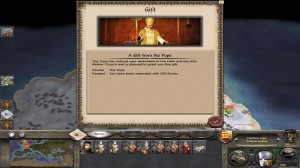
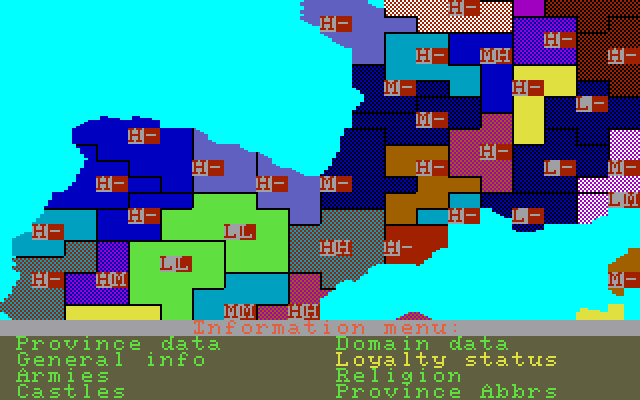
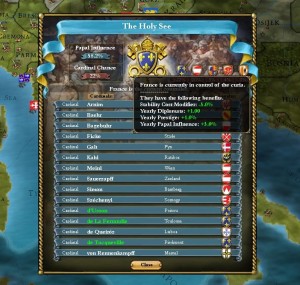
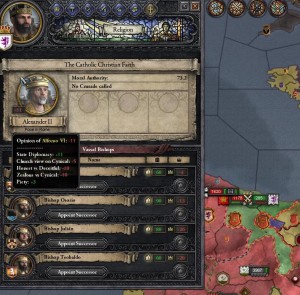
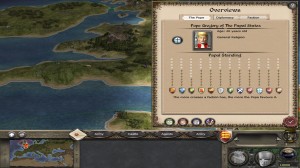
Actually, in Medieval II, the Pope doesn’t force you to end a war, but demands you “cease hostility”. Sadly, it’s not always clear what that means. The game usually warns you what a hostility is, but not always. In addition, because the warning is only aimed at you (I don’t think the game ever warns anyone but you), your enemy can in fact continue to attack you, but you’re allowed to defend. Luckily it’s based on a timer for 10 turns, after which a “cold” war can be taken up again. Waiting for the demand to time out is what I usually do; Because, it’s impossible to ever only be at war with one of those unrelenting warmonger AI’s in this game ;-)
BvG that’s not strictly true. I’ve certainly been in war where I’ve gotten a papal decree to stop attacking the *insert country here* where the timer hits, and the AI power attacks, and gets promptly excommunicated.
Which is often great. Hey the French just got excommunicated, and I was kicking their butt. Now I can continue the war with no risk.
I did rather love the pope in TW: M2 mainly because it became an active part of the strategy. A war with Venice (who controls the pope and College of Cardinals) would be very risky. Assasinating the pope, and bribing enough other countries, or getting enough cardinals, to get my pope elected could turn that battle. Now instead of drawing the ire of the pope with every attack (and flirting with excommunication) the Venetians are the ones excommunicated. Now cash flow is improved, rebellions are less frequent, and a Crusade into my enemy can be called.
Oh and getting a secretly female pope elected never got tiring.
Troy, that was an excellent and thorough piece. As a (non-lapsed) Catholic, I’m always fascinated by how religion and the Catholic Church in history is portrayed in games, even if it tends to be in those periods when the papacy wasn’t exactly positioned on the moral high ground. Machiavelli is the first game I think of when I think of a game involving the papacy, and as you point out that’s the period where they’re arguably most interesting strategically, but also where they operate the least like the more pious and pastoral popes of the modern age. It’s amazing what changes when you stop being a ruler of a politically significant parcel of land like the papal states!
I wish there were more games that played with religious themes in ways that aren’t just translated into statecraft. Even if they’re irreverent, like the old boardgame Credo (about composing the Nicene Creed). I don’t think I have the fortitude for Here I Stand, although it looks fascinating. Perhaps we’ll see some boardgames or indie games tackling the topic of the conclave after this one gets some attention. Certainly seems gameable, although I’m sure most attempts would end up with a cynical tone. Better than nothing!
This is a bit of a sidenote to the topic of this article, but it is possible to control the papal states (and have the pope as your vassal) in CK2. Set up an antipope and press his claim on rome. I discovered this accidentally in a recent game.
Game That Pope! | The American Catholic // Mar 9, 2013 at 7:05 pm
[…] Go here to read the fascinating rest.The papacy spans a huge portion of recorded history. Popes had had to meet challenges of all sorts in all the historical periods covered by two millenia. Games on the subject, so long as they are not Catholic bashing, I find fascinating. […]
The Weekly Playlist: the one where Paul is excommunicated and Jules is … | PC News | Game Unlimitted | Game, New and updates // Mar 11, 2013 at 2:02 am
[…] Papacy in games and how this religious agency is represented. I’m not the only one either, and this blog post by Troy Goodfellow, of Flash of Steel and Three Moves Ahead, gives a fine analysis of how interesting it can be to […]
Three Moves Ahead Episodes 209: Desktop to Tabletop // Mar 13, 2013 at 7:21 pm
[…] The Weekly Playlist: the one where Paul is excommunicated and Jules is … | PC News | Game Unlimitted | Game, New and updates on Heirs to Peter, Corrupters of Plans: The Pope as Game Mechanic […]
Diplomacy Board Game // Apr 30, 2013 at 10:56 pm
[…] #games #boardgames #gamesdeals #adultgames #kidsgames – Product Description: Diplomacy the game retu…"float:left;margin: 0 20px 10px 0;" src="http://ecx.images-amazon.com/images/I/516BE16CGYL._SL160_.jpg" alt="Diplomacy Board Game" /> Product Description: Diplomacy the game returns for Avalon Hills 50th Anniversary! Newly updated and good looking you will enjoy this game for many years. At the turn of the 20th century prior to World War I the seven Great European Powers engage in an intricate struggle for supremacy. Military forces invade and withdraw shifting borders and altering empires with subtle maneuvers and daring gambits. Alliances are formed and trust is betrayed as players negotiate and outwit one another in a delicate balance of cooper Product Features: […]
The whole time I’ve been reading this as “heirs to Peter, corrupters of Paul.”